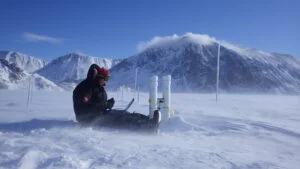
Science & Tech
20 Canadian innovations you should know about
Celebrating Canadian Innovation Week 2023 by spotlighting the people and organizations designing a better future
- 3327 words
- 14 minutes
People & Culture
Through fresh reporting and new perspectives, best-selling author John U. Bacon captures some of the best moments in Canadian sports history

The second the players walked into the lobby of the Intourist Hotel, designated solely for foreigners, they were welcomed with warm hugs and kisses from their wives, which they had expected. But they also received booming cheers from some 3,000 raucous Canadian tourists, which they definitely had not expected.
The Canadians, Sports Illustrated reported, came “supplied with beer, Scotch, mineral water, steak, Coca-Cola, towels, soap, toilet paper, miniature maple leaf buttons, regulation Canadian flags, enough gum to dam the Moskva River, and enough clothes to outfit the Soviet Army for the next 10 years.”
The Canadian travel agents had gotten the fans into the hotel the day before the players arrived, and they seemed to have spent the entire 24 hours getting a head start on the hotel’s ample sup- plies of world-class vodka. It was immediately clear that the hearty souls who made the rigorous and expensive trip were hard-core fans. There were no lightweights in that lobby.
Before meeting up at the Toronto airport for their flight, the wives knew only the women whose husbands played for the same team. The spouses effectively lived in the same silos the NHL had built for their husbands. But unlike their husbands, these women didn’t hesitate to get to know each other, so by the time they landed in Moscow they had already made lifelong friends. They’d also made a few friends among the fans, who had starting their ascent well before the plane’s.

“We were put on the plane with 200 drunk Canadians who already had their bottles,” recalls Joy Berenson, who had to leave her four children, between two and 10 years old, with her mother. Despite the disappointing start to the series, “None of the fans gave us any hard questions, and everyone was very kind to us, very respectful. No one asked us what had happened in the Canadian games.”
When the players heard 3,000 fans give them a raucous reception, after they had been hounded by the fans and media in Canada and Sweden, it got to them.
“Over the years, I guarantee you I’ve talked to at least a thousand of them who went over there,” Henderson says. “About 10 years after the series, Eleanor and I were in Windsor [Ontario] when two women came up to us to say they found out that they could go to Russia for 500 bucks, ‘And we had the time of our life, just on a whim. The time of our life!’
“Our little village of Lucknow, with less than a thousand people, had folks going. Our next-door neighbours came over to Russia. You look around that lobby at a few thousand Canadians you didn’t expect to see and you think, ‘Holy crap, these guys must’ve spent a lot of money over here!’ Other people who passed up their chance to go tell us, ‘Dammit all! We missed the chance of a lifetime!’ And they did!”

When Sharon Seiling ran up to her husband to give him a hug and a kiss, he recalls, “It gave you a sense of home.”
Most of the players hadn’t been home since August 13, more than a month earlier, and they wouldn’t be back until the end of September.
“We were used to long road trips,” Seiling adds. “That’s not out of the ordinary. But these were not ordinary conditions.”
Sharon told him, with a mischievous grin, “Just wait till you see our room!”
“Well, tell me about it,” Rod said. “No no—just wait till you see it.”
“So we go up to our room,” Seiling says, “and it’s just one of the worst rooms I’d ever seen. We had two beds basically made out of plywood, and what they called a mattress was an inch thick. I just looked at Sharon and said, ‘Just one more thing.’
“‘It’s like a Third World country!’ she replied. “‘But it is what it is, so let’s make the best of it.’ It wasn’t like someone else got a better room.”
Listen to John U. Bacon, author of The Greatest Comeback, discuss the Summit Series and his novel with David McGuffin on episode 47 of the Explore Podcast.
Are you passionate about Canadian geography?
You can support Canadian Geographic in 3 ways:

Science & Tech
Celebrating Canadian Innovation Week 2023 by spotlighting the people and organizations designing a better future

Places
In Banff National Park, Alberta, as in protected areas across the country, managers find it difficult to balance the desire of people to experience wilderness with an imperative to conserve it

People & Culture
The best-selling author and journalist discusses the reinvention of the game and the pressure to win

People & Culture
The story of how a critically endangered Indigenous language can be saved